How to Navigate the Gun Background Check Process
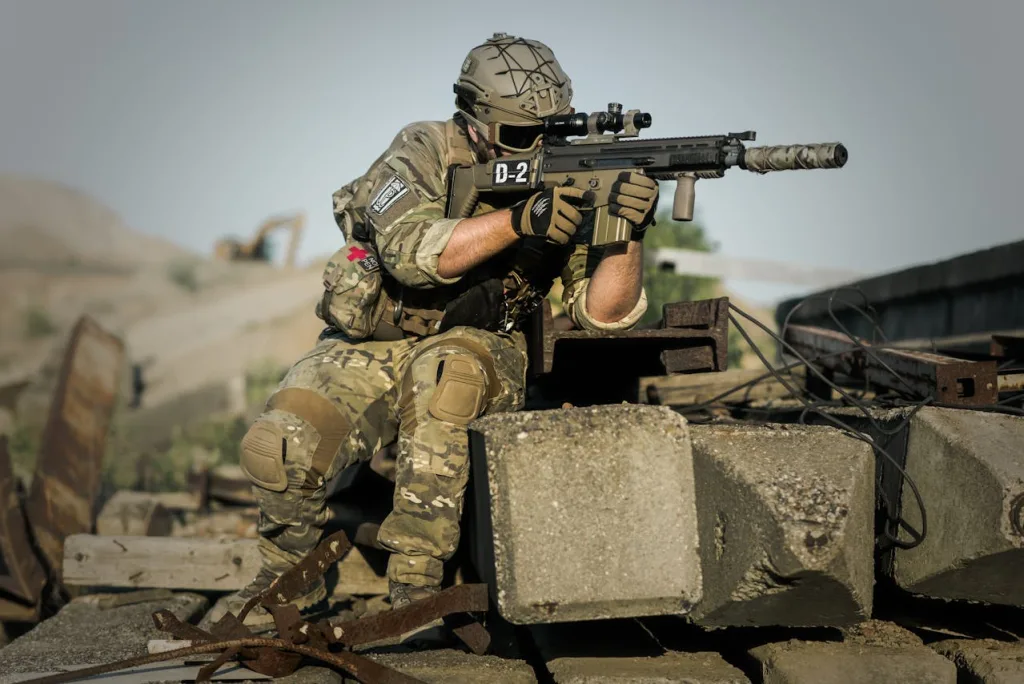
Introduction & Overview of Gun Background Checks
A gun background check is a process used to determine whether a person is legally eligible to purchase or possess a firearm. This check is typically conducted by federal or state authorities or by licensed firearm dealers, with the goal of ensuring that individuals who attempt to purchase firearms are not prohibited by law due to criminal history, mental health issues, or other legal restrictions. Gun background checks are essential for maintaining public safety, reducing firearm-related crimes, and promoting responsible gun ownership.
Why Are Gun Background Checks Necessary?
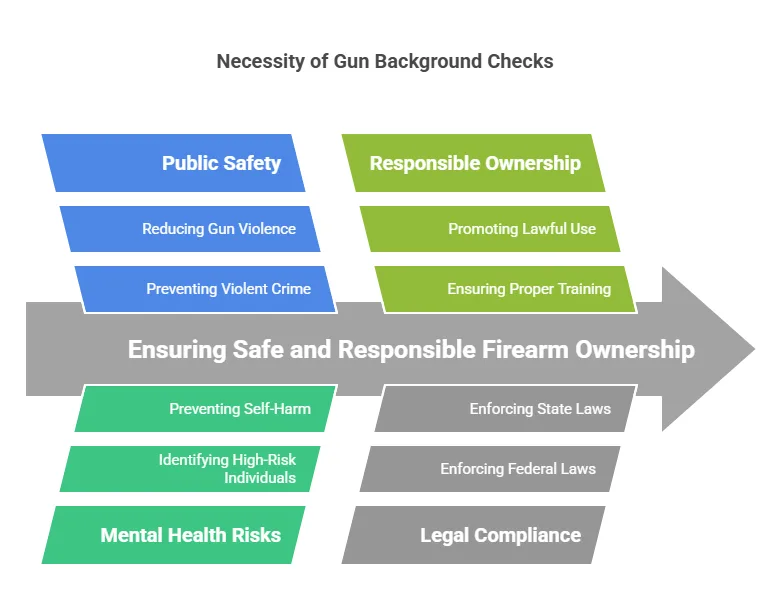
Gun background check serve a critical role in keeping firearms out of the hands of individuals who may pose a risk to themselves or others. Here are some reasons why these checks are necessary:
- Public Safety: Gun background checks help prevent individuals with a criminal history, particularly those convicted of violent crimes, from legally acquiring firearms. This is essential for reducing the likelihood of gun violence.
- Preventing Mental Health Risks: Individuals with a history of mental illness that may make them a danger to themselves or others are prohibited from purchasing firearms. Background checks help identify these individuals.
- Ensuring Responsible Ownership: By screening applicants, background checks ensure that only individuals who are lawfully permitted to own firearms are able to do so. This promotes responsible firearm ownership.
- Compliance with Legal Standards: Federal and state laws require background checks to help enforce restrictions on firearm ownership, such as preventing those with felony convictions or domestic violence charges from possessing firearms.
Types of Gun Background Checks
Gun background checks may vary based on the type of firearm transaction. The two most common types of checks are:
- Purchasing a Firearm: When buying a firearm from a licensed dealer, federal law requires that the buyer undergo a background check through the National Instant Criminal Background Check System (NICS). This check examines criminal history, mental health records, and other factors that may prevent a person from legally purchasing a firearm.
- Concealed Carry Permits: In addition to purchasing firearms, individuals seeking a concealed carry permit may undergo a background check as part of the application process. These checks are typically more thorough than those required for purchasing firearms and can include checks into state and local criminal history, mental health evaluations, and more.
- Private Party Transfers: In some states, private firearm sales may not require a background check, although many states have enacted laws requiring background checks for private transfers to close loopholes.
Importance of Gun Background Checks in Promoting Safety
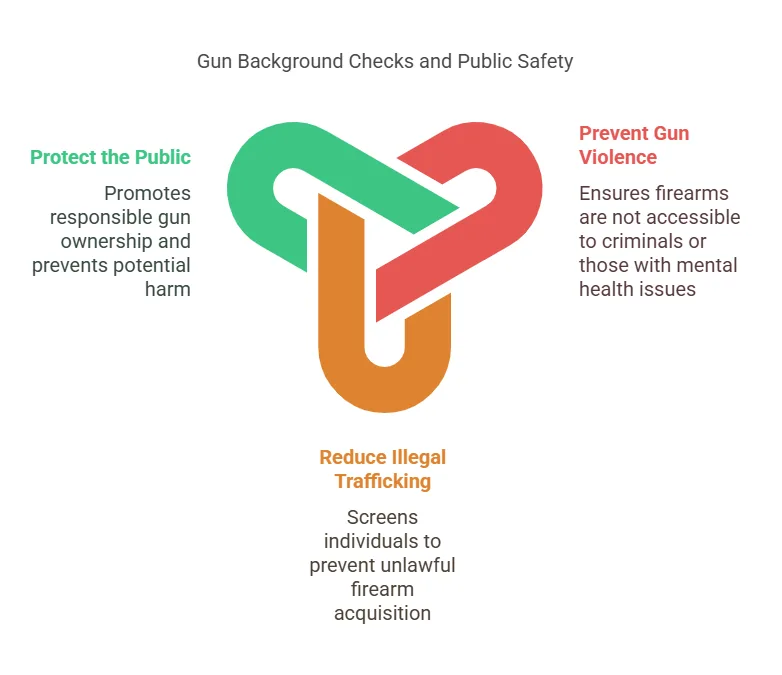
Gun background checks are one of the most effective tools in ensuring that firearms are only in the hands of responsible individuals. They help to:
- Prevent gun violence: By ensuring that convicted criminals or those with mental health issues are not able to purchase firearms.
- Reduce illegal firearms trafficking: By ensuring that individuals who try to bypass regulations to acquire firearms through unlawful means are screened.
- Protect the public: By promoting the responsible use of firearms while ensuring individuals who may be at risk of causing harm to themselves or others are prevented from owning guns.
The process of background checks is a vital mechanism in promoting public safety, reducing firearm-related crimes, and maintaining responsible gun ownership.
Step-by-Step Breakdown of How Gun Background Checks Are Conducted
The process of conducting a gun background check typically involves several steps to ensure that the applicant is eligible to purchase or possess a firearm. Here’s a detailed breakdown of how the process works:
- Filling Out the Application:
The first step in a gun background check is the completion of the necessary application form. For example, when purchasing a firearm from a licensed dealer, the buyer must fill out the Bureau of Alcohol, Tobacco, Firearms and Explosives (ATF) Form 4473. This form collects information such as personal details, criminal history, and mental health status. - Submitting Information:
Once the application is filled out, the buyer’s details are submitted for a background check. In the case of purchasing a firearm from a licensed dealer, the dealer will submit the buyer’s information to the National Instant Criminal Background Check System (NICS), which is maintained by the FBI. The NICS system is designed to review criminal records, mental health records, and other factors to determine eligibility. - Background Check Processing:
The NICS database checks the applicant’s information against a series of databases, including those related to criminal history, mental health issues, immigration status, and previous gun ownership. The processing time for a background check can vary, but typically, NICS returns results within a few minutes. In some cases, a “delay” is issued if there is a need for further investigation. - Review and Approval:
Once the NICS has completed the check, the results are sent back to the dealer or issuing authority. If the applicant is found to be eligible, the dealer will proceed with the firearm transaction. If the applicant is flagged for any reason (e.g., criminal record, mental health history), the application may be delayed or denied. - Notification of Results:
The applicant will receive the results of the background check. If the check is approved, the purchase can proceed. If it is denied, the applicant will be informed of the reasons for the denial and may have the option to appeal the decision or address any inaccuracies.
Types of Information Evaluated During a Gun Background Check
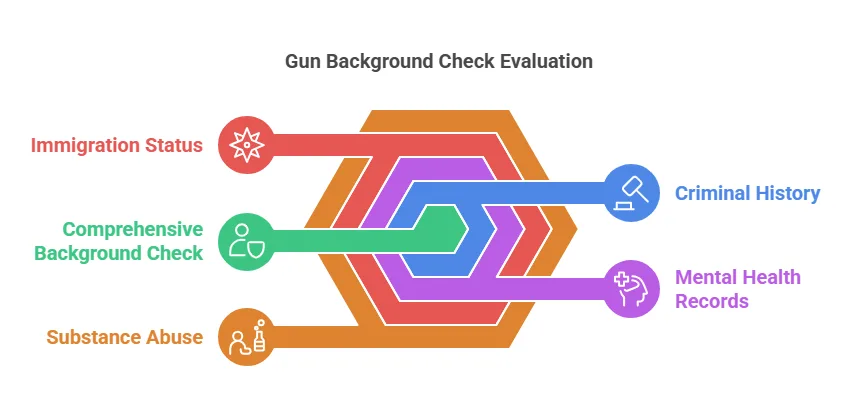
A comprehensive gun background check evaluates various aspects of the applicant’s history to ensure that they meet the legal requirements for owning a firearm. The primary types of information assessed during a gun background check include:
- Criminal History:
A major focus of any gun background check is the applicant’s criminal history. Background checks typically review national and state criminal databases to check for felony convictions or misdemeanor offenses related to domestic violence. Felony convictions often disqualify applicants from purchasing firearms, as do certain domestic violence charges. Depending on the state, the length of time since a conviction may also be relevant. - Mental Health Records:
In the U.S., individuals who have been adjudicated as mentally ill or who have been involuntarily committed to a mental health facility may be prohibited from owning firearms. Background checks often include an evaluation of mental health history to identify individuals who may pose a risk to themselves or others due to mental illness. - Immigration Status:
Gun background checks assess an applicant’s citizenship or immigration status. Non-citizens, including legal immigrants, may be prohibited from owning firearms in certain circumstances, depending on their immigration status. - Previous Gun Ownership:
Some background checks will review records related to previous firearms purchases or ownership. If an individual has had a gun purchase denied in the past or has a history of misusing firearms, it could be a red flag. - Restraining Orders:
Some background checks will flag applicants with active restraining orders, especially in cases where the applicant is prohibited from possessing firearms due to domestic violence or harassment. - Drug and Alcohol Abuse:
A history of substance abuse can disqualify an individual from legally owning a firearm. Background checks may review the applicant’s history of drug or alcohol addiction, including any legal findings or treatment records. - Dishonorable Discharges:
For military veterans or individuals who have served in the armed forces, a dishonorable discharge from military service can disqualify them from purchasing firearms. Background checks may include a review of military records. - State-Specific Data:
Depending on the state in which the background check is being conducted, the check may also include state-specific databases or considerations, such as local criminal histories or additional legal restrictions based on state law.
How Precise Hire Can Help
At Precise Hire, we offer comprehensive background check services that include detailed evaluations of criminal history, mental health records, and other critical factors for gun background checks. Whether you’re an individual firearm buyer, a licensed dealer, or a government agency, we can assist with accurate, thorough background screening services. Our streamlined approach ensures that you receive timely and reliable results for all types of firearm-related background checks.
Legal Considerations Related to Gun Background Checks
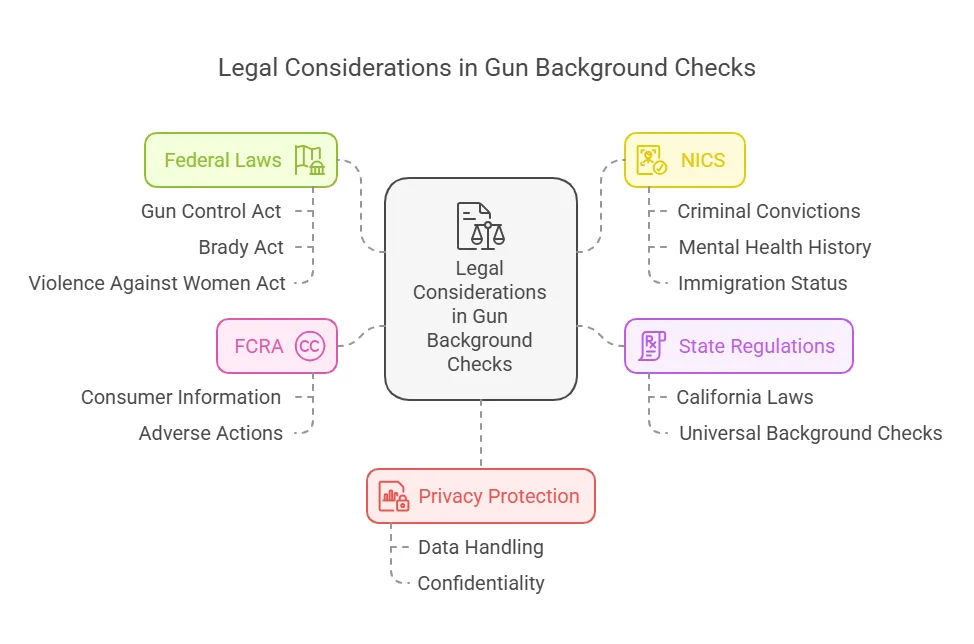
When conducting gun background checks, several important legal aspects must be adhered to in order to ensure that the process is compliant with federal, state, and local regulations. These regulations aim to protect public safety while upholding the rights of individuals. Some of the most critical legal considerations include:
- Federal Laws and Regulations
The Gun Control Act of 1968 (GCA) and the Brady Handgun Violence Prevention Act are two key federal laws that govern gun background checks. The Brady Act established the National Instant Criminal Background Check System (NICS), which is used to conduct background checks for individuals purchasing firearms from federally licensed dealers. The GCA prohibits certain individuals, such as convicted felons, fugitives, and individuals with restraining orders, from purchasing firearms.Furthermore, the Violence Against Women Act (VAWA) includes provisions that prohibit individuals convicted of domestic violence crimes from owning firearms. These laws set the legal foundation for background checks and require compliance by all firearm dealers and purchasers. - State Regulations and Laws
States have their own laws and regulations regarding gun ownership and background checks. While federal law sets minimum standards, states are free to enact stricter regulations if they choose. Some states may require background checks for private sales (also known as universal background checks), while others may have additional restrictions based on an applicant’s criminal history or mental health status.For example, California has implemented more stringent background check laws, including mandatory background checks for ammunition purchases and additional scrutiny of individuals on mental health hold lists. It’s essential for both gun buyers and dealers to understand and comply with their state’s specific laws. - Impact of the National Instant Criminal Background Check System (NICS)
The NICS, administered by the FBI, plays a critical role in firearm background checks. The NICS system checks several databases to determine whether an individual is eligible to purchase a firearm. It includes data on criminal convictions, mental health history, and immigration status. The NICS must be followed rigorously to ensure accurate and timely results. - Compliance with the Fair Credit Reporting Act (FCRA)
The Fair Credit Reporting Act (FCRA) governs the use of consumer information in background checks. While the FCRA is more commonly associated with employment or credit checks, it can also apply in certain circumstances if an individual’s financial history is included in a background check for firearms eligibility. FCRA compliance ensures that personal information is used responsibly and that applicants are notified of adverse actions taken based on the check. - Protection of Privacy
Gun background checks also involve sensitive personal information, and the protection of privacy is paramount. Federal and state laws ensure that personal data is handled securely and only used for legitimate purposes, such as determining eligibility to purchase a firearm. Agencies and organizations that conduct gun background checks must follow strict guidelines to protect the privacy and confidentiality of applicants.
Frequently Asked Questions (FAQs) About Gun Background Checks
How long does a gun background check take?
Most background checks are completed within minutes through the NICS system. However, if there is a delay due to additional information needed or discrepancies in the records, the check may take longer, sometimes up to three business days.
What happens if I fail a background check for a firearm?
If you fail a gun background check, the transaction will be denied. You may receive a notice explaining the reason for the denial. In some cases, you have the right to challenge the denial and correct any inaccuracies in your records, such as mistaken identity or errors in your criminal history.
Can a gun dealer sell a firearm without a background check?
Under federal law, licensed gun dealers are required to conduct a background check on anyone purchasing a firearm. However, private sellers in some states may not be required to perform background checks unless mandated by state law.
Can I appeal a denied background check for a firearm?
Yes, if you believe your background check result was inaccurate or unfairly denied, you can appeal the decision. This often involves providing additional documentation or disputing incorrect information in your record. The appeal process varies by state, and individuals are encouraged to contact the FBI or local authorities for guidance.
Do background checks for gun purchases include mental health records?
Yes, federal law prohibits individuals who have been adjudicated as mentally ill or involuntarily committed to a mental health facility from purchasing firearms. Background checks review mental health records to ensure compliance with these restrictions, but they are subject to state regulations regarding the disclosure of mental health information.
Are background checks required for concealed carry permits?
Yes, in most states, background checks are required when applying for a concealed carry permit. These checks are more comprehensive than those for general firearm purchases and may include additional evaluations of criminal and mental health histories.
Can I purchase a gun if I have a criminal record?
It depends on the nature of your criminal record. Felony convictions, especially those involving violence or drug offenses, generally disqualify an individual from purchasing firearms. Misdemeanors related to domestic violence may also prevent a purchase. The exact disqualification criteria depend on federal and state laws.
Conclusion
Gun background checks are a critical tool in ensuring public safety and preventing firearms from falling into the wrong hands. By evaluating various aspects of an applicant’s background—such as criminal history, mental health status, and previous gun ownership—these checks help promote responsible gun ownership and reduce the risk of firearm-related crimes.
It is important for both individuals and dealers to understand the legal requirements surrounding gun background checks, including federal and state regulations. The process ensures that only eligible individuals can legally possess firearms, and it offers a safeguard for the community as a whole.
At Precise Hire, we are committed to providing fast and reliable background check services, including gun background checks for individuals and organizations. Whether you’re purchasing a firearm, applying for a concealed carry permit, or screening potential employees, we offer the tools you need to stay compliant and make informed decisions.
Remember, thorough background checks are not just a legal requirement—they are an essential part of promoting safety and security. Always ensure that you follow proper procedures and adhere to applicable laws when conducting or undergoing a background check for firearms.
